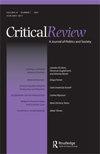后真相政治
IF 1.7
3区 社会学
Q4 POLITICAL SCIENCE
引用次数: 2
摘要
摘要一种流行的政治叙事是,我们正面临一场认识论危机,许多公民不再关心真相和事实。然而,我们生活在后真相时代的观点依赖于一些隐含的、有问题的经验和规范假设。后真相修辞将认知问题转化为动机问题,将与我们意见相左的人视为不再相信或关心真相。这种叙述在认识、道德和政治方面也令人怀疑。它在很大程度上对政治复杂性问题不敏感,这在认识上是可疑的;它在道德上是可疑的,因为“后真相”通常是对被认为愚蠢、不理性或道德受损的个人或团体的贬义标签;这是一个政治上有毒的新词,因为它声称使用“真相”的语言作为对抗权力的武器,然而这些真相主张本身往往是试图通过剥夺他人观点的合法性来对他人施加权力。虽然最近真相和民主的关系似乎特别糟糕,但政治和真相长期以来一直有着令人烦恼的关系,对政治中真实性价值的道德恐慌与政治本身一样古老。本文章由计算机程序翻译,如有差异,请以英文原文为准。
The Politics of Post-Truth
ABSTRACT A prevalent political narrative is that we are facing an epistemological crisis, where many citizens no longer care about truth and facts. Yet the view that we are living in a post-truth era relies on some implicit questionable empirical and normative assumptions. The post-truth rhetoric converts epistemic issues into motivational issues, treating people with whom we disagree as if they no longer believe in or care about truth. This narrative is also dubious on epistemic, moral, and political grounds. It is epistemically dubious in being largely insensitive to the problem of complexity in politics; it is morally dubious because “post-truth” is often a derogatory label for individuals or groups that are deemed stupid, irrational, or morally compromised; and it is a politically toxic neologism because it purports to use the language of ‘truth’ as a weapon against power, yet these truth-claims are often themselves attempts to exert power over others by delegitimizing their perspectives. While it may seem as if truth and democracy are on especially bad terms lately, politics and truth have long had a vexed relationship, and moral panics about the value of truthfulness in politics are as old as politics itself.
求助全文
通过发布文献求助,成功后即可免费获取论文全文。
去求助
来源期刊

Critical Review
POLITICAL SCIENCE-
CiteScore
1.30
自引率
12.50%
发文量
17
期刊介绍:
Critical Review: A Journal of Politics and Society is a political-science journal dedicated to advancing political theory with an epistemological bent. Recurrent questions discussed in our pages include: How can political actors know what they need to know to effect positive social change? What are the sources of political actors’ beliefs? Are these sources reliable? Critical Review is the only journal in which the ideational determinants of political behavior are investigated empirically as well as being assessed for their normative implications. Thus, while normative political theorists are the main contributors to Critical Review, we also publish scholarship on the realities of public opinion, the media, technocratic decision making, ideological reasoning, and other empirical phenomena.
 求助内容:
求助内容: 应助结果提醒方式:
应助结果提醒方式:


